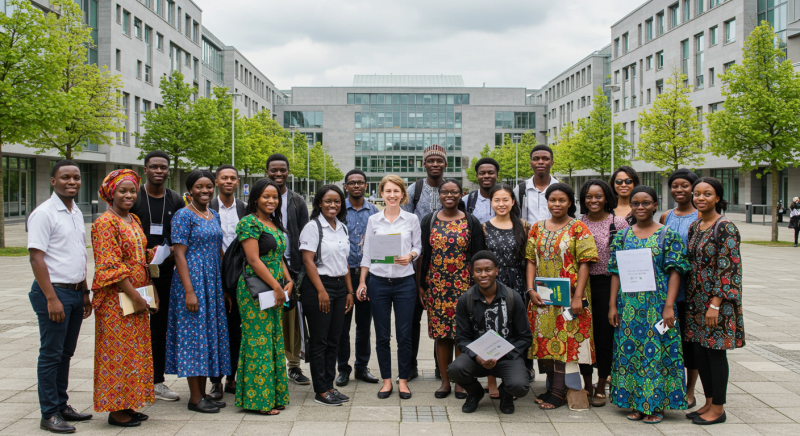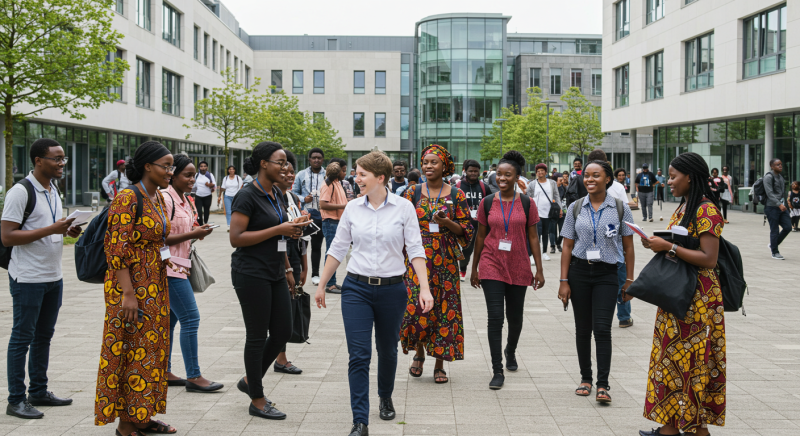you’re sitting in a lecture hall at one of the world’s top universities, receiving world-class education without paying a single kobo in tuition fees. This isn’t just a dream – it’s the reality for thousands of Nigerian students who have learned how to study free in Germany. With over 469,485 international students already benefiting from Germany’s tuition-free education system, you could be next.
The path to studying abroad can feel overwhelming, especially when you’re concerned about finances. But Germany has opened its doors wide, offering quality education that rivals any expensive private institution elsewhere. Since 2014, when Germany abolished tuition fees for international students, the number of students taking advantage of this opportunity has increased dramatically by over 55%.
Key Takeaways
Understanding how to study free in Germany requires mastering three critical elements: finding the right tuition-free universities, navigating the blocked account system, and successfully completing the visa application process. The financial requirement is clear – you’ll need €11,904 (approximately ₦21.7 million) in a blocked account, but this money remains yours for living expenses throughout your studies. With over 200 English-taught programs available at public universities, language barriers don’t have to stop your dreams.

What Makes Germany’s Education System Perfect for Nigerian Students
Germany’s commitment to free education stems from its belief that knowledge should be accessible to everyone, regardless of economic background. When you study free in Germany, you’re not getting a discounted version of education – you’re receiving the same high-quality instruction that German students receive.
Ever since the Government approved tuition-free education in Germany in 2014, international student numbers have spiked from 301,350 to 469,485. This dramatic increase shows just how attractive Germany’s education system has become for international students seeking quality education without the financial burden.
The German education model focuses on practical learning combined with theoretical knowledge. Universities work closely with industries, ensuring that what you learn directly applies to real-world situations. This approach has made German degrees highly respected worldwide, opening doors to employment opportunities across the globe.
Step 1: Choose Your Tuition-Free University in Germany
Finding the right university is your first step toward learning how to study free in Germany successfully. Public universities in Germany charge no tuition fees to international students, only small administrative fees ranging from €150 to €350 per semester.
Top Universities Where You Can Study Free in Germany
Technical University of Munich (TUM) stands as one of Germany’s most prestigious institutions. Universities in Germany like Technical University of Munich, Ludwig-Maximilians-Universität are ranked as some of the best in the world This university offers programs in engineering, natural sciences, and technology, all without tuition fees.
Ludwig-Maximilians-Universität München (LMU) represents another excellent choice for Nigerian students. Ludwig Maximilians University Munich is one of the highest-ranked universities in Germany and offers a variety of free options for Nigerian students. With generous scholarship programs, state tuition waivers, and fully funded research opportunities, there are numerous ways for Nigerians to access quality education without financial strain.
Humboldt University of Berlin provides diverse academic programs spanning natural sciences, arts, and humanities. The university’s location in Germany’s capital city offers additional networking and internship opportunities while you study free in Germany.
University of Hamburg excels in research and offers numerous English-taught programs. The city’s international atmosphere makes it easier for Nigerian students to adapt while pursuing their academic goals.
RWTH Aachen University specializes in engineering and technology programs. Known for its strong industry connections, this university helps students transition smoothly from academic life to professional careers.
English-Taught Programs Available
So don’t be discouraged in thinking you need to be fluent in German to study at these great programs. Additionally, once here, there are German-language courses available to you which you can take alongside your studies. Over 200 degree programs are taught entirely in English at German public universities, making it easier for Nigerian students to study free in Germany without language barriers.
Popular English-taught programs include International Business, Computer Science, Engineering disciplines, Environmental Sciences, and Master’s programs in various fields. Many universities also offer intensive German language courses alongside your regular studies, helping you integrate better into German society.
Step 2: Understanding the Blocked Account System
The blocked account (Sperrkonto) represents one of the most crucial requirements when you want to study free in Germany. This system ensures you have sufficient funds to support yourself during your studies, even though you won’t pay tuition fees.
Current Blocked Account Requirements for 2025
The German blocked account amount for 2025 is € 992 per month and € 11,904 per year (approx. NGN 1,808,617.10 and NGN 21,703,404.12). This requirement increased from previous years, reflecting Germany’s commitment to ensuring students can live comfortably while pursuing their education.
As of September 2024, the current Blocked Account amount required to apply for a German visa is 11 904 Euros. This amount is blocked on the student’s bank account for a year, and the student has access to no more than 992 Euros per month. This monthly withdrawal limit ensures your funds last throughout your academic year.
How the Blocked Account Works
Think of a blocked account as a savings account with restricted access. You deposit the full amount before applying for your visa, but you can only withdraw the specified monthly amount once you arrive in Germany. This system protects both you and the German government by ensuring you have consistent financial support throughout your studies.
The money in your blocked account covers living expenses including accommodation, food, transportation, health insurance, and personal expenses. Since you study free in Germany without tuition fees, this amount focuses entirely on maintaining a comfortable lifestyle.
Opening Your Blocked Account
You must open a blocked account before applying for your German visa or residence permit, so in most cases, you have to be in your home country. Several providers offer blocked account services, with Expatrio, Fintiba, and Deutsche Bank being the most popular choices among Nigerian students.
The process typically takes 2-3 weeks and requires your passport, university admission letter, and proof of funds. Each provider charges different fees, so compare options carefully. Fintiba offers comprehensive blocked account services with health insurance packages and additional support services that can simplify your preparation process.
Step 3: Mastering the German Student Visa Process
Successfully obtaining your German student visa is essential to study free in Germany. Nigerian students must apply for a national visa (Type D) for studies lasting longer than 90 days.
Required Documents for Your Visa Application
Your visa application requires several documents, each serving a specific purpose in demonstrating your eligibility to study free in Germany. The application form must be completed accurately, as any errors can delay processing.
Your passport must be valid for at least 12 months beyond your intended stay. Include all pages, even blank ones, when submitting copies. University admission letters prove your academic acceptance, while your blocked account certificate demonstrates financial stability.
Academic transcripts and certificates need official translations into German or English. Some consulates require apostilled documents, so check specific requirements for the German consulate in Lagos or Abuja. Health insurance proof is mandatory – you can obtain this through German providers or international student insurance companies.
Application Process Timeline
Start your visa application process at least 3-4 months before your intended departure date. The German consulate in Nigeria typically processes student visa applications within 4-6 weeks, but this can extend during peak application periods.
Book your appointment online through the consulate’s official website. Arrive early on your appointment day with all documents organized in the required order. The consulate staff will review your application and may ask questions about your study plans and financial preparation.
Interview Preparation Tips
Prepare to explain why you want to study free in Germany specifically. Research your chosen university and program thoroughly. Be ready to discuss your career goals and how your German education will help achieve them.
Practice answering questions about your financial situation, including how you obtained the blocked account funds. Demonstrate your commitment to returning to Nigeria after completing your studies, as this addresses potential immigration concerns.

Step 4: Managing Living Costs While You Study Free in Germany
Although you study free in Germany without tuition fees, understanding living costs helps you budget effectively and make the most of your blocked account funds.
Monthly Living Expenses Breakdown
Accommodation typically represents your largest expense, ranging from €300-600 monthly depending on your city and housing type. Student dormitories offer the most affordable option, while private apartments cost more but provide greater independence.
Food expenses average €200-300 monthly if you cook at home regularly. German supermarkets offer affordable options, and many universities provide subsidized meals in student cafeterias. Learning to cook simple Nigerian dishes using local ingredients helps maintain familiar flavors while controlling costs.
Transportation costs vary by city but generally range from €60-90 monthly for student public transport passes. Many cities offer significant student discounts on public transportation, making it easy to explore your new home while you study free in Germany.
Health insurance is mandatory and costs approximately €110 monthly for students. This comprehensive coverage includes medical, dental, and emergency services. Some providers offer additional benefits like preventive care and specialist consultations.
Part-Time Work Opportunities
Nigerian students can work part-time while studying, providing additional income beyond blocked account funds. Student visas allow up to 120 full days or 240 half days of work annually. This flexibility helps you gain work experience while supplementing your finances.
Popular student jobs include working as teaching assistants, research assistants, or in service industries like restaurants and retail. University career centers often post part-time positions specifically for international students. The experience you gain can be valuable for future career development.
Money-Saving Strategies
Take advantage of student discounts available throughout Germany. Many restaurants, entertainment venues, and shops offer reduced prices for students. Your student ID card opens doors to numerous savings opportunities while you study free in Germany.
Share accommodation with other students to reduce housing costs. Many international students form housing groups, creating supportive communities while splitting expenses. This arrangement also helps with cultural integration and language practice.
Cook meals at home rather than dining out frequently. German grocery stores offer quality ingredients at reasonable prices. Joining international student cooking groups can help you learn new recipes while sharing costs for larger meals.
Step 5: Preparing for Academic Success
Successfully transitioning to German academic culture requires preparation and adaptability. Understanding expectations helps you thrive while you study free in Germany.
Scholarship Opportunities to Support Your Journey
Don’t let the blocked account requirement discourage you if funding seems challenging. The German Academic Exchange Service (DAAD) offers numerous scholarship opportunities specifically for international students, including Nigerians. Every year, the DAAD grants students as well as lecturers from Nigeria scholarships and opportunities to study, teach or conduct research in Germany.
DAAD scholarships can help cover living expenses, reducing the financial burden while you study free in Germany. These scholarships often provide monthly stipends, health insurance coverage, and sometimes even travel allowances. The application process is competitive but accessible to motivated students with strong academic records.
German universities emphasize independent learning and critical thinking. Professors expect students to engage actively in discussions and develop original ideas. This approach differs from some educational systems but develops valuable analytical skills.
Attendance policies vary by program, but consistent participation demonstrates commitment to your studies. Many courses combine lectures with seminars, requiring both theoretical understanding and practical application of concepts.
Research skills become crucial as you progress through your program. German universities provide extensive library resources and research support. Learning to navigate these resources early in your studies will benefit your entire academic journey.
Language Considerations
Even if you study free in Germany through English-taught programs, learning basic German improves your daily life significantly. Many administrative processes, housing arrangements, and social interactions involve German language.
Most universities offer free German language courses for international students. Taking advantage of these opportunities enhances your experience and opens additional academic and professional possibilities. Basic conversational German helps with shopping, banking, and building relationships with local students.
Step 6: Building Your Support Network
Creating connections while you study free in Germany enhances both your academic experience and personal well-being. Strong networks provide practical support and lasting friendships.
Connecting with Other Nigerian Students
Nigerian student associations exist in most German cities with significant student populations. These groups provide valuable support for newcomers, sharing practical advice about everything from finding accommodation to understanding German bureaucracy.
Experienced Nigerian students often mentor newcomers, helping them navigate challenges you might not anticipate. This peer support proves invaluable during your adjustment period while you study free in Germany.
Social media groups and WhatsApp communities connect Nigerian students across different universities. These platforms share information about scholarships, job opportunities, and social events. Joining these communities before arrival helps you establish connections early.
Integrating with International and German Students
University international offices organize orientation programs specifically for foreign students. These events help you understand academic expectations, practical procedures, and social opportunities. Participating actively in orientation activities jumpstarts your integration process.
Student clubs and organizations provide excellent opportunities to meet people with similar interests. Whether you enjoy sports, music, academic subjects, or cultural activities, German universities offer numerous clubs welcoming international members.
Language exchange programs pair international students with German students learning foreign languages. These partnerships help improve your German while sharing Nigerian culture with local students. Many language exchange relationships develop into lasting friendships.

Frequently Asked Questions
Can I really study completely free in Germany as a Nigerian student? Yes, public universities in Germany charge no tuition fees to international students, including Nigerians. You only pay small administrative fees of €150-350 per semester. However, you need to demonstrate financial ability to cover living expenses through a blocked account.
How much money do I actually need to study free in Germany? You need €11,904 in a blocked account for visa purposes, which equals approximately ₦21.7 million at current exchange rates. This money remains yours for living expenses during your studies, with monthly withdrawals of €992.
Do I need to speak German to study free in Germany? No, over 200 degree programs are taught entirely in English at German public universities. However, learning basic German improves your daily life and provides additional opportunities during your studies.
Can I work while studying in Germany? Yes, Nigerian students can work up to 120 full days or 240 half days annually while studying. This provides additional income and valuable work experience alongside your studies.
How long does the visa application process take? The German student visa application typically takes 4-6 weeks to process, but you should start the entire process 3-4 months before your intended departure to account for document preparation and potential delays.
What happens if I can’t afford the blocked account amount? Some scholarship programs and sponsors can help cover blocked account requirements. Organizations like DAAD offer financial support that can assist with blocked account funding. Additionally, some German universities offer payment plan options or alternative financial guarantees, though these are less common.
Are there scholarship opportunities to help with living costs? Yes, organizations like DAAD, university-specific scholarships, and private foundations offer funding opportunities for international students. Research and apply for these early in your preparation process.
Can I bring my family while I study free in Germany? Students can apply for family reunification visas for spouses and children, but this requires proving additional financial resources beyond the standard blocked account amount. Each family member needs separate financial guarantees.
Conclusion
Learning how to study free in Germany opens doors to world-class education without the crushing debt that burdens students in many other countries. The process requires careful planning, financial preparation, and determination, but thousands of Nigerian students have successfully navigated this path to academic and professional success.
Remember that when you study free in Germany, you’re not just earning a degree – you’re gaining international experience, building global networks, and developing skills that will serve you throughout your career. The investment in your blocked account returns to you as living expenses, while the education you receive creates lasting value for your future.
Start your preparation early, stay organized throughout the process, and don’t hesitate to seek help from university international offices, Nigerian student associations, and educational consultants. Your dream of studying at one of the world’s top universities is achievable, and Germany’s commitment to accessible education makes it possible for motivated students regardless of their economic background.
The journey to study free in Germany begins with a single step – choosing your university and program. Take that step today, and begin building the foundation for a brighter, more educated future that will benefit not only you but also contribute to Nigeria’s development when you return with your international experience and advanced skills.
Read more Unlock Your Fortune: Starting a Real Estate Business in the USA Today | Complete 2025 Guide
Image Prompts for the Article
- Modern German university campus with international students – Wide shot of a beautiful German university campus with diverse group of students walking, including identifiable African students, showcasing the international environment.
- German visa application documents laid out – Neat arrangement of passport, application forms, university letter, blocked account certificate, and other required documents on a clean desk surface.
- Nigerian student studying in German university library – Student of Nigerian descent focused on studies in a modern German university library, surrounded by books and using a laptop, showing academic dedication.
- Cost of living breakdown infographic for Germany – Visual chart showing monthly expenses (accommodation, food, transport, insurance) with euro amounts and colorful icons, targeted at student budget planning.
- .
- Nigerian student cooking in German student housing – Young Nigerian student preparing a meal in a modern German student residence kitchen, showing adaptation to new living environment.
- Success story graduate photo – Nigerian graduate in cap and gown at German university graduation ceremony, representing successful completion of studies and achievement of academic goals.
